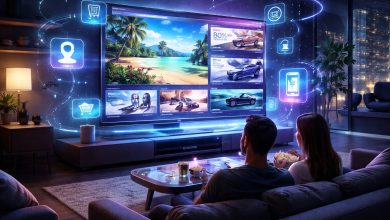
We live in the most connected era in human history, yet nearly half of U.S. adults report feeling lonely, according to the U.S. Surgeon General. Infinite scrolling, algorithmic matches, and global access to others online still leave many people yearning for deeper connections. Loneliness has become a public health crisis, and innovators are using advancements in social discovery, like AI, to create solutions that foster the next iteration of human connection. The future of intimacy is digital, and AI is already reshaping what it means to connect, communicate, and care.
Digital Intimacy Is Here And It’s Personal
The new era of communication plays out virtually, and relationships—emotional, romantic, even sexual— are mediated through technology. For many, these connections don’t represent second-rate substitutes for “real” life. A study from Pew Research reveals that people turn to social discovery platforms for community, support and connection.
This shift didn’t happen overnight. It started decades ago with programs like ELIZA in the 1960s, which mimicked therapist conversations. It evolved through Tamagotchis, dating simulators like LovePlus, social media, and streaming through platforms like Twitch or OnlyFans. Now, with the rise of large language models (LLMs) and emotionally adaptive AI, we have crossed into something new: machines that remember us, mirror our moods, and offer companionship on demand.
AI Dating Advisors and Companions
People are adopting AI as a tool for social discovery, dating, and emotional support at an exponential rate. The 14th Annual Singles in America study shows that U.S. singles have increased their use of AI in their dating lives by 333% over the past year alone—an astounding rise that highlights shifting attitudes about technology’s role in our most personal experiences. They are using AI to sort through matches and navigate digital conversations, reshaping dating for a chronically online generation.
Gen Z is now pushing the boundaries of this evolution. Unlike previous generations, they are not just using AI as a supplemental tool but are beginning to form emotional bonds with it. A 2025 survey indicates that more than 80% of Gen Z respondents envision themselves forming deep connections with an AI companion. For them, digital relationships offer more comfort, personalization, and perceived safety
AI’s role in relationships extends far beyond simulating a human partner.. Emerging platforms are designing AI to serve as emotional mirrors, adaptive coaches, and trusted confidants that learn from a user’s mood, communication style, and needs over time. These systems don’t aim to replace connections; they aim to foster them in an increasingly digital world.
The Rise of Synthetic Influencers
Synthetic influencers and virtual personas are forming a new layer of parasocial intimacy beyond one-on-one AI relationships. Cloneable content creators, AI-generated TikTokers,and metaverse avatars are blurring the lines between content and connection with their emotionally attuned, hyper-available simulations.
For investors and innovators, this shift represents a goldmine. Connection is becoming a product, and demand is skyrocketing. Early-stage startups are creating emotionally intelligent digital personas, ushering us into an age where intimacy becomes scalable, customizable, and monetizable.
AI will continue to transform how we form, sustain, and experience relationships.
There’s no doubt about that. Instead of resisting this evolution, we must lead it with empathy, imagination, and ethical clarity. Applying yesterday’s logic to tomorrow’s realities poses the greatest danger from this technology. By building with intention, we can make AI one of the most powerful forces for connection in the 21st century.




